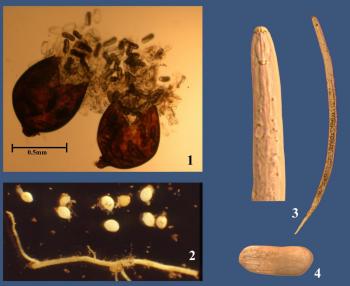Nematode Assays
Announcement with Regard to the Nematode Assay Service
The UMass Extension Nematology Lab closed its doors October 1, 2021. Dr. Robert Wick has retired after 36 years of dedicated service.
The UMass Extension Plant Diagnostic Lab will continue to handle nematology samples for vegetables, fruit, ornamentals, and pinewood nematodes; however, we will no longer be accepting samples for turfgrass nematology.
For more information, please see https://ag.umass.edu/services/plant-diagnostics-laboratory or call Dr. Angela Madeiras at 413-545-3209.
Alternative Turf Nematology Services:
- Dr. Nathaniel Mitkowski, University of Rhode Island - http://www.uriturf.org/
- Dr. Rich Buckley, Rutgers - https://njaes.rutgers.edu/plant-diagnostic-lab/
- Dr. William Crow, University of Florida - http://entnemdept.ufl.edu/people-directory/billy-crow/
 Nematodes, the Unseen Enemy of Golf Greens
Nematodes, the Unseen Enemy of Golf Greens
Plant parasitic nematodes occur in all soils but in golf greens they can build up to very high population densities. Golf greens are an ideal environment for nematodes providing a uniform host with a long growing season. Repeated topdressing results in a sandy texture which provides ideal pore spaces for oxygen, water and nematode mobility and reproduction. Golf greens are irrigated frequently and nematodes are aquatic animals requiring moisture for mobility. When plant parasitic nematode populations become high, they result in root dysfunction followed by wilting and thinning of the turf, and very likely increase susceptibility to stress diseases like anthracnose. Wilting and thinning are not unique to nematode injury; anything that results in root dysfunction can produce these symptoms. The only way to determine if nematodes are a problem is to have the soil assayed for nematode population levels. The types of nematodes in greens do not change very much; the species composition present today will likely be the same twenty years from now.
A Nematode Survey is a Health Check-up for your Greens
A survey of nematodes will indicate whether you have potentially injurious nematodes, or weak parasites. We determine this by identifying the genera of nematodes extracted from the soil. While the number of nematodes per 100 cc of soil will change yearly due to various factors including natural enemies, the genera and species will not change substantially. In addition to assaying your soil for nematodes we can also estimate how many nematodes are infected by natural soil dwelling parasites (fungi and bacteria).
Contact:
Dr. Robert Wick
University of Massachusetts
109 Fernald Hall
270 Stockbridge Road
Amherst, MA 01003-9285
Tel: (413) 545-1045
Fax: (413) 545-2115
E-mail: rlwick@umass.edu